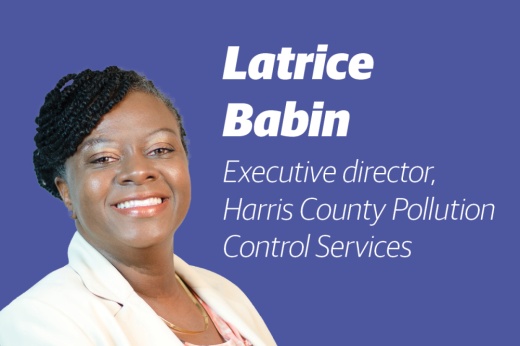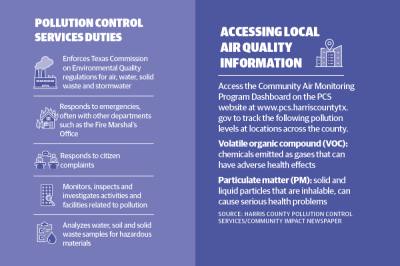In recent months, Harris County has seen several high-profile environmental complaints, from a lawsuit filed against Union Pacific for an alleged cancer cluster in Houston’s Fifth Ward, to an investigation of the Texas Commission on Environmental Quality over how it issues permits for concrete batch plants. In an interview with Community Impact Newspaper, Babin talks about what inspired her career path, what Pollution Control Services does, and her future goals for the department and tackling pollution issues countywide.
This interview has been edited for length and clarity.
Where did you grow up, and how did you get into your current role?
I actually grew up in the Crosby-Barrett Station area, which is on the east side of the county. My father worked at a chemical plant, and so I was very used to him coming home and the odors that lingered in his Nomex. My father passed when I was graduating from college with my bachelor’s degree—he passed away of cancer. The more I learned of science when I went back to graduate school, I recognized that ... my father’s early demise was probably connected to his line of work.
One of my earlier career jobs that I took was with pollution control. I was an investigator for a very short time... and then moved into the laboratory where I really got exposed to the analysis and looking at what those chemical components and those contaminants were. My interest grew from being in the laboratory and answering questions that other investigators had, ... and I decided that I wanted to go to graduate school and do some more studying.
I actually went back and got a Ph.D. in environmental toxicology. In that track, I moved through several positions in [PCS], from water quality specialist, to the policy person for environmental toxins, and then eventually became the deputy director, interim director and now the executive director of the department.
What does your department do?
We are the local government regulating authority for the environmental laws. We do not issue permits, ... but we do enforce permits that are issued by the Texas Commission on Environmental Quality. We also regulate for the Clean Air Act, Clean Water Act and Resource Conservation and Recovery Act. Anything that has an environmental aspect to it that we are given statutory authority by the state Legislature is under our purview.
We work with TCEQ, with the Environmental Protection Agency and we work with county agencies as well. We work very closely with the Harris County Fire Marshal's Office when there is anything like a spill, a fire, [or] explosion. ... We do work with the Harris County Flood Control and Engineering ... and work very closely with all of the departments that we need to touch in any aspect of any investigation or to provide information or data.
Who works for Pollution Control Services?
When I first came in as the interim director [of PCS], we were at 44, including me. We've grown to 77 now ... over just about three years. Most of [our staff] are natural science majors. It's important that they understand how the body and chemistry and the elements of contaminants may work together.
What changes have happened since your appointment?
I wanted to make sure that we were able to be more transparent ... and provide a repository of information that the community could go to. We developed a more robust website, [and] developed a link to our [new] network of monitors that could look at ambient air for contaminants, not just ozone—we've had ozone monitors for decades. But we included monitors that could look at toxins as well as particulate matter so that when we had an event like a fire at a facility ... we could look at what those contaminant levels might be that go into the environment as well as the particulate from the burning of whatever that was that was on fire. It was really important that that information was able to be transmitted and translated so that the community could see ... and that it's viewable on our dashboard.
How has the environment changed in Harris County over the last century?
Actually, air quality has improved from when [PCS was] established [in 1953]. That predated the development of the EPA. We were appointed by the Commissioners Court at the time ... because the water quality and the air quality was so bad. ... We had to use some very different rules to make an impact on pollution at that time. But over the decades, water quality has improved. Life has come to the Houston Ship Channel, ... and air quality has improved. You don't see the overall dark haze of smog that they were seeing back then.
But we still have a lot that we still have to do. There are things that, not just as a county but as a state and a region, that needs to be worked on ... because we all share the same airshed.
How big of a role does environmental justice play in your career?
I've always had a passion for helping those that don't have a voice. And so the fact that there's things that are happening in communities that are lower socioeconomic and underserved, ... and if there's a prevalence of something there, it just sparks the passion for us to help. ...
Some of the things that we're doing that's different under my leadership is community engagement. With the concrete batch plants for example, we not only have an inspection program, ... but also when there is a permit that is issued, we look to see if it's going to impact anybody in the 440[-yard] area radius, and then we send them letters to let them know [and that] they can make a comment to the TCEQ.
What would you say to residents who feel their voices are not being heard?
Speak up. If you have questions, ask questions [and] reach out. If it’s not the right people, keep asking until you get to the right people. Check out our information to see if we're the group that you need to reach out to, and if we're not, ... we will make sure that we help you find who you need to find to get your question answered. I'm all about providing transparency and providing information.






